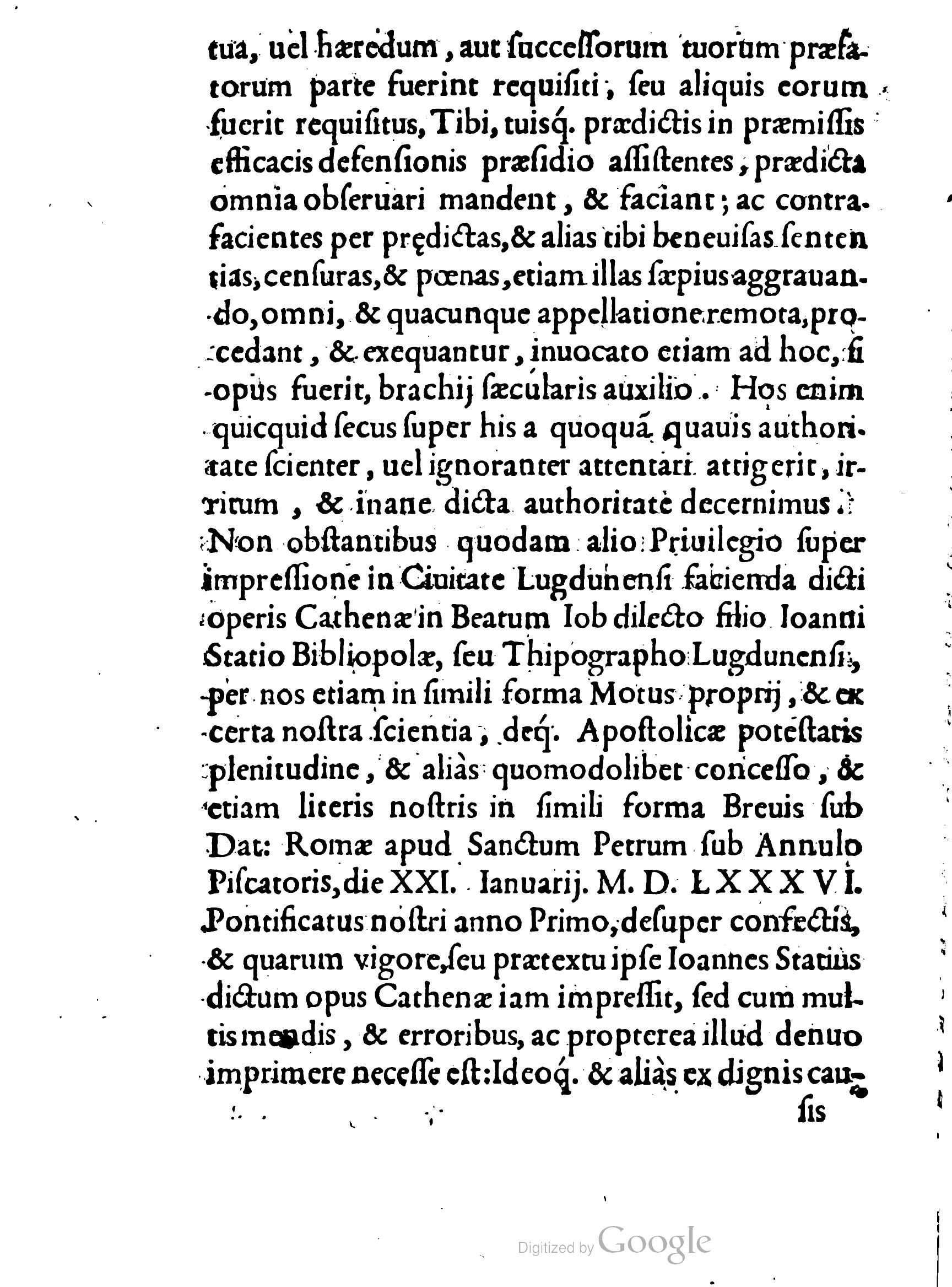PRIMARY SOURCES
ON COPYRIGHT
(1450-1900)
Source: Vatican Secret Archives Sec. Brev. Reg. 130 F. 70 (1587)
Citation:
Privilege to Giovanni Giolito di Ferrari for publication of Paolo Comitolo's "Catena in Beatissimum Job," and revocation of Jean Stratius' privilege in the same work, Vatican (1587), Primary Sources on Copyright (1450-1900), eds L. Bently & M. Kretschmer, www.copyrighthistory.org
Back | Record | Images | Commentaries: [1]
Translation only | Transcription only | Show all | Bundled images as pdf
Superscript = inserted by original or different author between lines
[ ] = inserted by original or different author in margin
{ } = supplied by transcribers
Bold Script [or] Script or scribble = written in a different hand(s)
Strike through = crossed out, but legible
[XXX] = illegible
Ordering each and every of our Venerable brothers, Patriarchs, Archbishops and bishops, and their dear sons in spiritual things, the Vicars general, and the remaining [men] stationed in ecclesiastical office who with whatever authority see to it or will see to it that, whenever they are required on your behalf or on behalf of your aforementioned heirs or successors, or [whenever] one of these [religious authorities] is required, they will order and cause all the aforementioned things to be observed, assisting you and your aforementioned [heirs or successors] in the [affairs] set out above by means of the protection of an effective legal defense, and that they will proceed and prosecute violators per the aforementioned and other sentences, censures, and punishments [that] seemed proper for each aggravation, however frequently, and with each and every right of appeal taken away [and with] the aid of the secular branch invoked if there is a need.
Moreover, we decree by the said authority that whatever happens to be attempted, knowingly or unknowingly, to the contrary in these matters by anyone on any authority {is} without effect and in vain. Notwithstanding a certain other privilege concerning a printing made in the City of Lyon of the said work, a commentary on Blessed Job by {our} dear son Joannes Statius, a Lyonnais bookseller or printer, granted through us also in a similar form of motu proprio and out of our certain knowledge and from the plenitude of apostolic power and other {powers} in whatever way, and also {notwithstanding} our letters in the similar form of a {papal} breve, granted in Rome at Saint {P}eter{’s Basilica} under the Ring of the Fisherman on the eleventh day of January, 1586, the First Year of our pontificate, by the strength or protection of which previously executed {privilege} and {letters} Joannes Statius himself already printed but with many mistakes and errors, and therefore it is necessary to print that {work} again, and, for that
reason and {stemming} from other worthy reasons which animate our desire, we completely revoke, make void, annul, and terminate the privilege granted and our letters granted, likewise, the contents of each, to the same Joannes Statius, through us, thus, as it is presented, as if they were adopted verbatim with the present things fully and sufficiently expressed, as to the work itself, [the work] of the commentary, with the things deriving thence [i.e., from the commentary], and if [least of all] ever [these things] should have arisen.
Superscript = inserted by original or different author between lines
[ ] = inserted by original or different author in margin
{ } = supplied by transcribers
Bold Script [or] Script or scribble = written in a different hand(s)
Strike through = crossed out, but legible
[XXX] = illegible
- tua vel haeredum, aut successorum tuorum praefa=
- torum[1] parte fuerint requisiti, seu aliquis eorum
- fuerit requisitus, Tibi, tuisque praedictis in praemissis
- efficacis defensionis praesidio assistentes, praedicta
- omnia observari mandent, & faciant; ac contra=
- facientes per pr{a}edictas, & alias tibi[2] benevisas senten=
- tias, censuras, & poenas, etiam illas saepius aggravan=
- do, omni, & quacunque appellatione remota, pro=
- cedant, & exequantur, invocato etiam ad hoc, si
- opus fuerit, brachii saecularis auxilio. Hos[3] enim
- quicquid secus super his a quoqua{m} quavis authori=
- tate scienter, vel ignoranter attentari attigerit[4], ir=
- ritum, & inane dicta authoritate[5] decernimus.
- Non obstantibus quodam alio Privilegio super
- Impressione in Civitate Lugdunensi facienda dicti
- operis Cathenae in Beatum Iob dilecto filio Ioanni
- Statio Bibliopolae seu Thipographo Lugdunensi,
- per nos etiam in simili forma Motus proprii, & ex
- certa nostra scientia, deque Apostolicae potestatis
- plenitudine, & alias[6] quomodolibet concesso, &
- etiam literis nostris in simili forma Brevis sub
- Dat[7]: Romae apud Sanctum Petrum sub Annulo
- Piscatoris, die XXI. Ianuarii. M.D. LXXXVI.
- Pontificatus nostri anno Primo, desuper confectis[8],
- & quarum vigore, seu praetextu ipse Ioannes Statius
- dictum opus Cathenae iam impressit, sed cum mul=
- tis mendis, & erroribus, ac propterea illud denuo
- imprimere necesse est: Ideoque & alias[9] ex dignis cau=
[1] In handwritten privilege: praedictorum.
[2] In handwritten privilege: sibi.
[3] In handwritten privilege: Nos.
[4] In handwritten privilege: attestari contigerit.
[5] In handwritten privilege: auctoritate.
[6] In handwritten privilege: aliis.
[7] In handwritten privilege: datis.
[8] In handwritten privilege, following confectis: cuius.
[9] In handwritten privilege: aliis.












